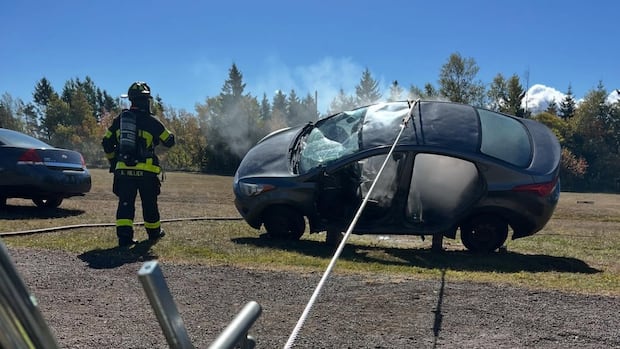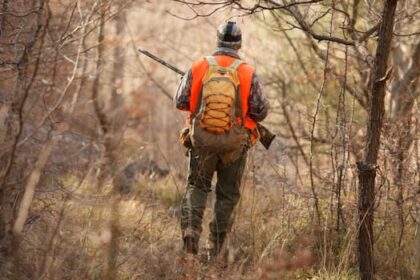PEIFirefighters from across the Maritimes gathered on P.E.I. over the weekend to learn more about combating electric vehicle fires and blazes caused by lithium-ion batteries.Two-day session on P.E.I. focuses on fighting lithium-ion battery fires and the risks involvedRyan McKellop · CBC News · Posted: Sep 22, 2025 6:53 AM EDT | Last Updated: 5 hours agoPeter Vandenbroek, with Red Island Training Days, says fires caused by smaller lithium-ion batteries, such as those in drill batteries, can be especially dangerous. (Taylor O’Brien/CBC)Firefighters from across the Maritimes gathered on P.E.I. over the weekend to learn more about combating electric vehicle fires and blazes caused by lithium-ion batteries.About 75 firefighters from departments in Prince Edward Island, New Brunswick and Nova Scotia began the two-day training Saturday with a lecture at UPEI. On Sunday, they took part in hands-on training.Peter Vandenbroek, with Red Island Training Days — organized by the P.E.I. Firefighters Association — said EV and lithium-ion battery fires present unique challenges.”One of the things we’re hearing with EVs is the large amount of water it takes to extinguish the fires, because the batteries, when they go into thermal runaway, can… create their own oxygen, which keeps feeding the fire,” Vandenbroek told CBC News.”And the batteries are underneath the vehicle, so they’re tougher to access, requiring more water to be applied to the battery pack to cool it down and actually extinguish the fire.”Vandenbroek said there are other challenges when responding to fires caused by smaller lithium-ion batteries.”Smaller battery packs, like a drill battery, are powered by a lot of smaller batteries inside, and when they catch fire and they explode, the smaller batteries that are inside the packs can actually spread throughout the house,” he said.”And [they] land on sofas, or beds, or on their furniture, causing fires in other locations in the house that you weren’t expecting when you first arrived on scene.”A growing threatPaul Shoemaker, instructor and owner of Next Level Training Network, has spent 14 years educating in the fire service and the last eight focusing on lithium-ion batteries. He led the weekend course.He said the training addressed both vehicles on the road and batteries involved in house fires.”I try to show them videos of not only scientific things that are coming out to show what lithium-ion batteries do in a house, but then I also show real-life videos,” Shoemaker said.”Because we’re having a lot of people encounter these fires, not only in cars out on the street, but you know, scooters, e-bikes inside of a home.”Firefighters take part in hands-on training on Sunday, practicing techniques for handling electric vehicle and lithium-ion battery fires. (Next Level Training Network/Facebook)Shoemaker warned that batteries can turn a regular house fire into a “nightmare” for firefighters as the flames burn with more intensity, and they also have the side effect of emitting toxic gases.”Our bunker gear is not rated for the intensity of the flames that come off of these things, and the gases that come off of these things are very, very toxic — super, super nasty for our lungs, our skin,” he said.”And these gases carry heavy metals [that] are traced back to cancerous cells that could kill us — maybe not immediately, [but] maybe end our life earlier.”‘There just needs to be more training’Shoemaker hopes this training becomes a regular thing across departments in order to keep citizens and firefighters safe as more people move towards using EVs and use lithium-ion batteries.”There just needs to be more training for these individuals at a very beginning level, like when they just step into the fire service. Don’t wait, and don’t just say you get the training once,” he said.”You can have it once, you’ll forget 70 per cent of what you learned. That’s just how our brains work. You may have it two or three times before you’re feeling comfortable dealing with something so new.”Rob Squires, a firefighter with the Kinkora Fire Department, says he plans to use the knowledge gained to train his fellow firefighters at the station. (Taylor O’Brien/CBC)Rob Squires, an Island firefighter at the Kinkora Fire Department, said he plans to share what he learned with his colleagues.”Every bit of information that we get is that much better for us. We need to be able to learn our job best we can and to know it’s continuous learning,” he said.Squires said that this training is “invaluable” and that it is important to get that training and information to as many people as possible.ABOUT THE AUTHORRyan McKellop is a graduate of the Holland College Journalism program and a web writer at CBC P.E.I.With files from Taylor O’Brien
Maritime firefighters train on tackling electric vehicle and battery fires











